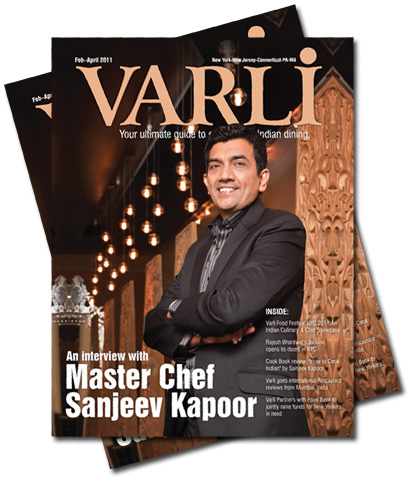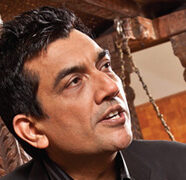An Interview with Master Chef Sanjeev Kapoor
A chef extraordinaire that has brought the ar t of Indian cooking to the forefront of the international palette, Sanjeev Kapoor continues to forge ahead with new ideas and creative ventures. Already a household name in India as the host of the hit television show Khana Khazana, Sanjeev Kapoor is on a mission to give Indian cuisine a worldwide presence. He has consulted as a guest star on Western cooking shows and keynoted international food festivals. He has penned countless best-selling cookbooks and even created his own line of Indian condiments. Here, seated in the lounge of Junoon Restaurant, NYC, he talks to Varli about his upcoming cookbook, his rise to fame, and his favorite pastimes.
As one of the most celebrated names in Indian cuisine today, how did you get your start?
I started out by working in several different hotels and restaurants across the world. When I came back to India in 1992 as a young 28 year old, I was made Executive Chef at a fairly large and prominent hotel. Although the honor and experience was amazing, I eventually began to feel like I had reached my professional peak in some ways. In order to push myself beyond managing a group of hotels, I decided to pursue a Master’s in Marketing to broaden my skill set. Soon after that, I was approached by a TV cooking show that initially was only interested in having me participate for one episode with a panel of different chefs to be featured. Although I was just one of the chefs on this show, I was so excited by the opportunity that I began putting in more time and effort than any of the other participants – putting my heart and soul into the project helped me stand out and led to my start in TV 17 years ago.
What inspired you to create your latest cookbook, How to Cook Indian?
I actually have over 140 cookbooks, but they are all produced in India. After hearing countless people ask about books made for those who are not necessarily Indian, I started my line of U.S. publications with the book Simple Indian Cooking, which covers the length and breadth of Indian cuisine – North, South, East, West, Central, etc. Seeing the success of that venture, I continued with How to Cook Indian, a cookbook whose recipes I’ve been working on for almost 2 years. It’s an amazing guide, and I’m proud to say there’s nothing else like it in the U.S. market.
Your list of accomplishments are lengthy, including being selected by CNN’s Richard Quest as one of the top 5 celebrity chefs in the world, along with the likes of Gordon Ramsay, Jamie Oliver, and Wolfgang Puck. What has allowed you to have such a cross-cultural appeal?

I think my biggest advantage is understanding the market. Whatever you’re doing, you have to really know who you’re doing it for – and once you start understanding your audience and thinking about things from their perspective, they start to respect and believe in you. Suddenly, you realize there’s a huge network of people who have become your community, your fans, and your faithful supporters.
Recently the cooking show Khana Khazana was recognized by the Indian Television Academy as the longest running TV show in history. What has made it such a success?
I think there’s one primary factor in the show’s success: simplicity. Over time, I’ve realized that the people who are watching my show are also actively using what they learn. I try to ensure that if somebody watches my program, and uses any of the information I give them, that it really adds to their success in cooking. I give them comfort and confidence in the kitchen, and help them achieve their goals so they are constantly challenged and satisfied.
When did you start cooking?
It’s funny because when you’re well known in the culinary world, you can really name any age and get away with it…it’s almost
like you’re supposed to say “I’ve been cooking since I was three months old! “ Growing up, I didn’t really cook on a significant level until I started training professionally.
After cooking for as long as you have, how do you manage to keep your recipes fresh and inspired?
I made a promise to myself not to cook a dish twice, and that helps greatly. To keep cooking in new and unique ways is not difficult if you believe it’s just a matter of playing with different ingredients, and if you have the confidence that whatever you do, will work! No matter what combinations you throw together, the dish will work out if you just cook with an upbeat attitude and positive energy.
You’ve earned a Best Meal Concept and Innovation award for consulting work you did for Indian Airlines. How is designing an in-flight meal different from ordinary cooking?
It’s very difficult to come up with a menu for airlines because there are so many restrictions and rules for what you cannot do. You have to precook a meal, freeze it, chill it, and then reheat it. When it’s reheated, the meal is re-cooked and you are not in charge of the process, so that has to be taken into account in making the dish fool-proof every time. When I was planning the in-flight menu, everybody told me I should try more complicated meals because there would be passengers from all over the world ready to try the cuisine, but I held firmly to my belief that a simple meal would taste best in all conditions – and sure enough, it worked.
Are there any emerging trends that you’ve noticed in Indian cuisine?
What I’ve begun to see in the recent past is a lot of emphasis on foods from different regions of India. There is cross-promotion within the regions, so people in the north are excited about foods from the south, for example, and coastal foods from western India are becoming more popular. Also, Indian food over the past few years is becoming much lighter and healthier to accommodate the changing preferences of diners today. There used to be a layer of oil floating on the tops of dishes, or plenty of deep-fried items on every menu. That’s changing fast, and is great because it means Indian cuisine is keeping up with new customer tastes.
Do you have any hobbies or interests outside of the cooking world?
Music is definitely at the top of my list of hobbies. I actually keep a trumpet in my office that I pull out and play when time permits during the day. Also, my younger daughter is an athlete and I love to run with her, and spend time with the rest of my family.
What advice can you give to aspiring chefs and Varli readers?
To all the people who like to cook Indian food, I would tell them to spend more time in India. Go to all the varied and beautiful regions and familiarize yourself with the ingredients available during different seasons. Learn about the unique ingredients themselves – how they smell, taste, and feel. You’ll never really master the art of Indian cooking if you’re not close to the land and heritage because great Indian cooking isn’t something you can do without intimate knowledge. And my advise to anyone who wants to cook good food is that one should start appreciating food no matter who has cooked it.
This interview was published in Varli Magazine (April 2011).
Read complete magazine online by clicking here.






